选修7 Unit 4《Sharing》第一导学案
- 格式:doc
- 大小:92.50 KB
- 文档页数:9
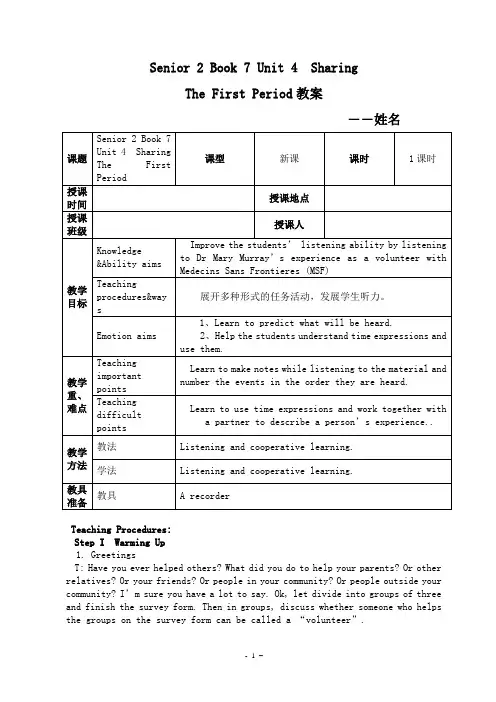
Senior 2 Book 7 Unit 4 SharingThe First Period教案――姓名Teaching Procedures:Step I Warming Up1. GreetingsT: Have you ever helped others? What did you do to help your parents? Or other relatives? Or your friends? Or people in your community? Or people outside your community? I’m sure you have a lot to say. Ok, let divide into groups of three and finish the survey form. Then in groups, discuss whether someone who helps the groups on the survey form can be called a “volunteer”.Step II Listening(I)(The teacher plays the tape and the students listen to it.)T: Now let’s check the answers of Exercis e 1 and 2.(The students will answer the questions)T: Now let’s listen to the dialogue for a second time. When you are listening, you can check the answers of Exercise 2 and finish Exercises 3 and 4. Learn to make notes about Mary’s experiences in the ta ble on Page 35. And share your notes with your partner and then with other groups.(The students will makes notes, and share their notes.)T: Ok, let’s listen to it for a third time to check the notes.Step III Listening(II)T: Perhaps you may wonder, because we are students, what we can do to help. That is, what can we do to serve communities outside the school? Ok, let do LISTENING in the workbook on Page 70. You are also required to predict what you will hear, according to the four questions.Step V AssignmentT: Boys and girls, today we have listened to two materials about giving help to others. I do hope all of us will help those who need help. Besides, you should learn to predict what you will hear before listening and pay attention to the time expressions while listening.Step VI Homework1. Finish the LISTENING TASK on Page 75-76. Remember to predict what you will hear according to the given information and also pay attention to time expressions.2. Google for more information about MSF and share it between us.。
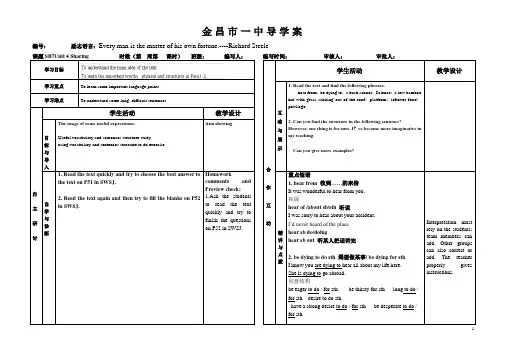
金昌市一中导学案编号:励志语言:Every man is the master of his own fortune.----Richard Steele课题SB7Unit 4 Sharing时数(第周第课时)班级:编写人:编写时间:审核人:审批人:学习目标合作互动学生活动教学设计学习重点To learn some important language points互动与展示1. Read the text and find the following phrases.hear from;be dying to;a bush school;Science;a low bamboo hut with grass sticking out of the roof;platform;leftover food;privilege2. Can you find the structure in the following sentence? However, one thing is for sure, I’ve become more imaginative in my teaching.Can you give more examples?学习难点To understand some long, difficult sentences自主研讨学生活动教学设计目标与导入The usage of some useful expressions:Useful vocabulary and sentences structure study.using vocabulary and sentences structure to do exercise.[Aim showing自学与诊断1. Read the text quickly and try to choose the best answer tothe text on P51 in SWSJ.2. Read the text again and then try to fill the blanks on P52in SWSJ.Homeworkcomments andPreview check:1.Ask the studentsto read the textquickly and try tofinish the questionson P52 in SWSJ.精讲与点拨重点短语1. hear from 收到……的来信It was wonderful to hear from you.拓展hear of /about sb/sth 听说I was sorry to hear about your accident.I’d never heard of the place.hear sb do/doinghear sb out 听某人把话讲完2. be dying to do sth 渴望做某事/ be dying for sthI know you are dying to hear all about my life here.She is dying to go abroad.同意结构be eager to do / for sth be thirsty for sth long to do /for sth desire to do sthhave a strong desire to do / for sth be desperate to do /for sthInterpretation mustrely on the students;team members canadd. Other groupscan also correct oradd. The teacherproperly givesinstructions.检测与评价学生活动教学设计达标检测题检测与纠错Test andconsolidation:Ask the students todo the test and thenthe group markthem and give thescores they shouldget.distribute vt 分发,分配@ distribute sth to /among sb/sth 把……分配/发给……1) The volunteers are distributing the food to/among the victims of Yushu earthquake.@ distribution n. 分配;分布2) The map shows the distribution of this species across the world.练习1.The teacher _____________________(把书分配给) the pupils.(distribute)distributed the books to2. What about ____________________(财富的分配) in this country? (distribution)the distribution of wealth总结与升华高考链接What do you want to do next? We have half an hour untilthe football game?--- ____. Whatever you want to do is fine with me.A It just dependsB It’s up to youC All rightD Glad to hear thatDoes it __ any difference whether we leave at 9:00 orat 10:00?A tellB beC giveD make答案BDAsk the students tosummarize theusage of theexpressions in thesentences.课后反思:。
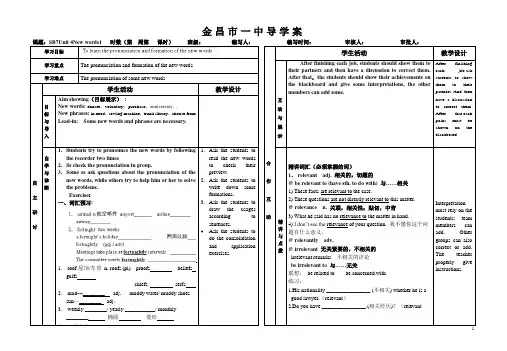
金昌市一中导学案课题:SB7Unit 4New words1 时数(第周第课时)班级:编写人:编写时间:审核人:审批人:学习目标合作互动学生活动教学设计学习重点The pronunciation and formation of the new words互动与展示After finishing each job, students should show them totheir partners and then have a discussion to correct them.After that,the students should show their achievements onthe blackboard and give some interpretations, the othermembers can add some.After finishingeach job,askstudents to showthem to theirpartners And thenhave a discussionto correct them.After that,eachpoins must beshown on theblackboard.学习难点The pronunciation of some new words自主研讨学生活动教学设计目标与导入Aim showing(目标展示):New words: donate,voluntary,purchase,anniversary…New phrases: in need,sewing machine,trunk library,choose fromLead-in: Some new words and phrases are necessary.自学与诊断1.Students try to pronounce the new words by followingthe recorder two times2.Ss check the pronunciation in group.3.Some ss ask questions about the pronunciation of thenew words, while others try to help him or her to solvethe problems.Exercise I.一、词汇预习:1.roof屋顶/车顶n. roofs (pl) proofs beliefsgulfschiefs serfs2.mud---________ adj. muddy water/ muddy shoessun—________ adj.3.weekly ________/ yearly ___________/ monthly________ 椭圆菱形1.Ask the students toread the new wordsto check theirpreview.2.Ask the students towrite down someformations.3.Ask the students todraw the usagesaccording tosentences.4.Ask the students todo the consolidationand applicationexercises.精讲与点拨精讲词汇(必须掌握的词)1.relevant adj. 相关的,切题的@ be relevant to (have sth. to do with) 与……相关1) These facts are relevant to the case.2) These questions are not directly relevant to t his matter.@ relevance n. 关联,相关性;贴切,中肯3) What he said has no relevance to the matter in hand.4) I don’t see the relevance of your question. 我不懂你这个问题有什么意义。
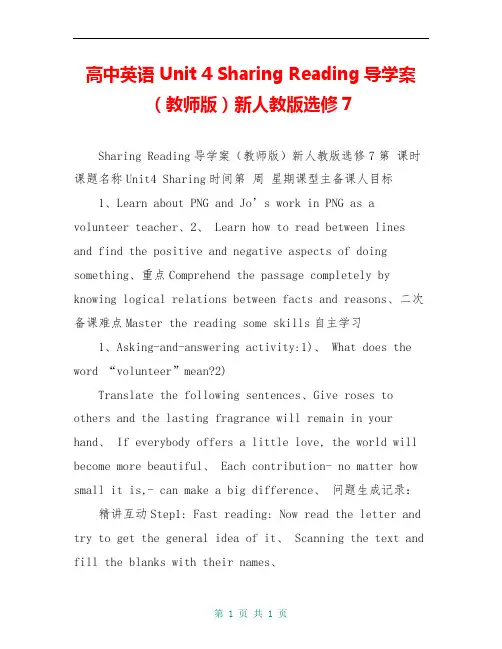
高中英语 Unit 4 Sharing Reading导学案(教师版)新人教版选修7Sharing Reading导学案(教师版)新人教版选修7第课时课题名称Unit4 Sharing时间第周星期课型主备课人目标1、Learn about PNG and Jo’s work in PNG as a volunteer teacher、2、 Learn how to read between lines and find the positive and negative aspects of doing something、重点Comprehend the passage completely by knowing logical relations between facts and reasons、二次备课难点Master the reading some skills自主学习1、Asking-and-answering activity:1)、 What does the word “volunteer”mean?2)Translate the following sentences、Give roses to others and the lasting fragrance will remain in your hand、 If everybody offers a little love, the world will become more beautiful、 Each contribution- no matter how small it is,- can make a big difference、问题生成记录:精讲互动Step1: Fast reading: Now read the letter and try to get the general idea of it、 Scanning the text and fill the blanks with their names、1、__ _____ _ is a young Australian woman、2、__ ___ _ was dying to hear all about Jo’s life in PNG、3、 walked a long way to get to school、4、 did n’t have any textbook、5、 became a lot more imaginative when teaching、6、 started jumping out the windows during a chemistry experiment、7、 visited a village that was the home of one of the boys, Tombe、8、started crying “ieee ieee” to welcome them、9、 led us to a low bamboo hut、10、 was going to share the platform with Jenny and Jo、11、softly talked to each other in their language Jo didn’t understandStep2: Careful reading: Now you’re to read the passage carefully to complete the tables below! Table1 (about the school)Conditions Our schoolThe school described in the letterClassrooms(equipped ornot)Students’ futureElectricity andwater(Y/N)Textbook(Y/N)Chemistry experiments(many/few)Table2 (about the life in the village)Types of housesDietFamily relationshipsPossessionsCookingmethodsAgricultureSleeping arrangementsBeliefs达标训练根据课文内容完成下列短文填空。
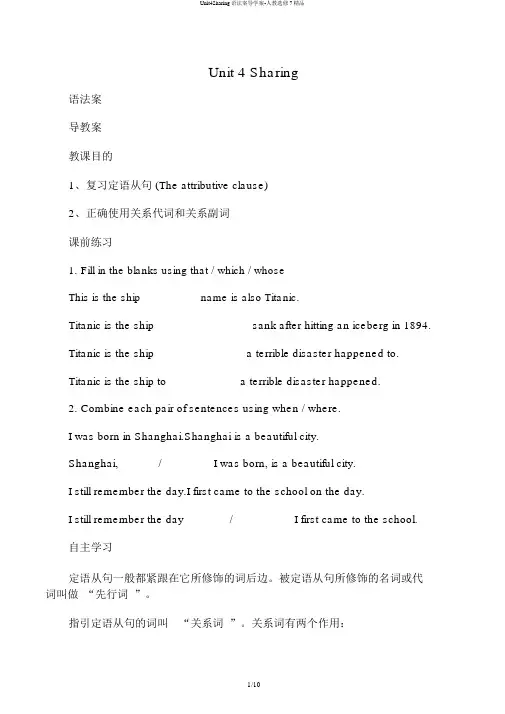
Unit 4 Sharing语法案导教案教课目的1、复习定语从句 (The attributive clause)2、正确使用关系代词和关系副词课前练习1.Fill in the blanks using that / which / whoseThis is the ship _________ name is also Titanic.Titanic is the ship _______________ sank after hitting an iceberg in 1894.Titanic is the ship ______________ a terrible disaster happened to.Titanic is the ship to ___________ a terrible disaster happened.bine each pair of sentences using when / where.I was born in Shanghai.Shanghai is a beautiful city.Shanghai, ______/________ I was born, is a beautiful city.I still remember the day.I first came to the school on the day.I still remember the day _______/__________I first came to the school.自主学习定语从句一般都紧跟在它所修饰的词后边。
被定语从句所修饰的名词或代词叫做“先行词”。
指引定语从句的词叫“关系词”。
关系词有两个作用:1.指引定语从句。
2.取代先行词在其指引的定语从句中充任必定的句子成分。
关系词作用whichthatwhowhomwhen 成分wherewhy要点一:用“代入法”分析定语从句 ,大体有以下几个步骤:1:通读全句 ,找出先行词 :(即定语从句所修饰的词)。
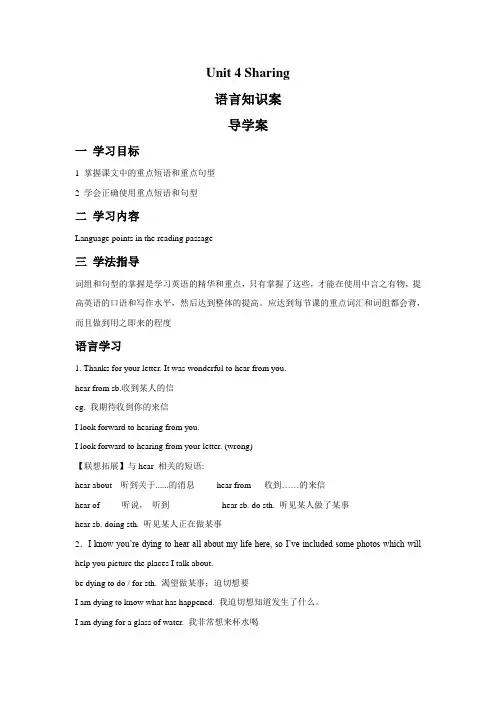
Unit 4 Sharing语言知识案导学案一学习目标1 掌握课文中的重点短语和重点句型2 学会正确使用重点短语和句型二学习内容Language points in the reading passage三学法指导词组和句型的掌握是学习英语的精华和重点,只有掌握了这些,才能在使用中言之有物,提高英语的口语和写作水平,然后达到整体的提高。
应达到每节课的重点词汇和词组都会背,而且做到用之即来的程度语言学习1. Thanks for your letter. It was wonderful to hear from you.hear from sb.收到某人的信eg. 我期待收到你的来信I look forward to hearing from you.I look forward to hearing from your letter. (wrong)【联想拓展】与hear 相关的短语:hear about 听到关于......的消息hear from 收到……的来信hear of 听说,听到hear sb. do sth. 听见某人做了某事hear sb. doing sth. 听见某人正在做某事2.I know you’re dying to hear all about my life here, so I’ve included some photos which will help you picture the places I talk about.be dying to do / for sth. 渴望做某事;迫切想要I am dying to know what has happened. 我迫切想知道发生了什么。
I am dying for a glass of water. 我非常想来杯水喝(1) 我极想出国___________________________________________________________(2) 他很渴望喝点酒_______________________________________________________【联想拓展】“渴望”的类似说法(1) have a strong desire for sth.(2) be eager to do(3) be thirsty for sth.(4) desire to do sth.(5) long to do sth. / for sth.单项选择:Smallpox(天花), a kind of disease, has now died______.A. outB. awayC. offD. down3. Sometimes I wonder how relevant chemistry is to these students,most of whom will be going back to their villages after Year 8 anyway.relevant adj. 有关的,相关的;切题的What you said is not relevant to the matter in hand.你所说的事与目前考虑中的问题无关。
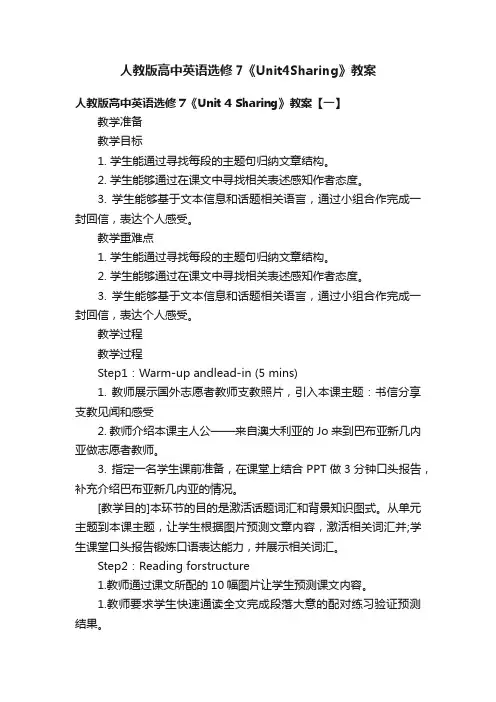
人教版高中英语选修7《Unit4Sharing》教案人教版高中英语选修7《Unit 4 Sharing》教案【一】教学准备教学目标1. 学生能通过寻找每段的主题句归纳文章结构。
2. 学生能够通过在课文中寻找相关表述感知作者态度。
3. 学生能够基于文本信息和话题相关语言,通过小组合作完成一封回信,表达个人感受。
教学重难点1. 学生能通过寻找每段的主题句归纳文章结构。
2. 学生能够通过在课文中寻找相关表述感知作者态度。
3. 学生能够基于文本信息和话题相关语言,通过小组合作完成一封回信,表达个人感受。
教学过程教学过程Step1:Warm-up andlead-in (5 mins)1. 教师展示国外志愿者教师支教照片,引入本课主题:书信分享支教见闻和感受2. 教师介绍本课主人公——来自澳大利亚的Jo来到巴布亚新几内亚做志愿者教师。
3. 指定一名学生课前准备,在课堂上结合PPT做3分钟口头报告,补充介绍巴布亚新几内亚的情况。
[教学目的]本环节的目的是激活话题词汇和背景知识图式。
从单元主题到本课主题,让学生根据图片预测文章内容,激活相关词汇并;学生课堂口头报告锻炼口语表达能力,并展示相关词汇。
Step2:Reading forstructure1.教师通过课文所配的10幅图片让学生预测课文内容。
1.教师要求学生快速通读全文完成段落大意的配对练习验证预测结果。
2.教师引导学生归纳出全文的整体结构。
[教学目的] 本环节的目的是让学生了解文章的整体结构。
不仅让学生学会寻找中心句,而且让学生从每个段落的中心句归纳出课文整体结构,让学生回顾信息交流类书信的写作结构。
Step3:Reading fordetails (10 minutes)1.教师要求学生先同桌配对合作,然后按照学习小组分组合作,仔细阅读文章细节找出信息,完成下列表格(划线部分是学生需要填出的部分):2.教师引导学生根据文章中的相关语言和信息体会作者的感情和态度。
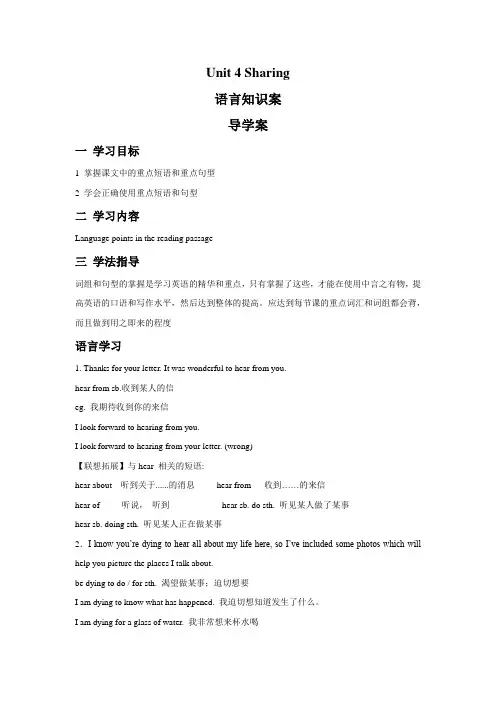
Unit 4 Sharing语言知识案导学案一学习目标1 掌握课文中的重点短语和重点句型2 学会正确使用重点短语和句型二学习内容Language points in the reading passage三学法指导词组和句型的掌握是学习英语的精华和重点,只有掌握了这些,才能在使用中言之有物,提高英语的口语和写作水平,然后达到整体的提高。
应达到每节课的重点词汇和词组都会背,而且做到用之即来的程度语言学习1. Thanks for your letter. It was wonderful to hear from you.hear from sb.收到某人的信eg. 我期待收到你的来信I look forward to hearing from you.I look forward to hearing from your letter. (wrong)【联想拓展】与hear 相关的短语:hear about 听到关于......的消息hear from 收到……的来信hear of 听说,听到hear sb. do sth. 听见某人做了某事hear sb. doing sth. 听见某人正在做某事2.I know you’re dying to hear all about my life here, so I’ve included some photos which will help you picture the places I talk about.be dying to do / for sth. 渴望做某事;迫切想要I am dying to know what has happened. 我迫切想知道发生了什么。
I am dying for a glass of water. 我非常想来杯水喝(1) 我极想出国___________________________________________________________(2) 他很渴望喝点酒_______________________________________________________【联想拓展】“渴望”的类似说法(1) have a strong desire for sth.(2) be eager to do(3) be thirsty for sth.(4) desire to do sth.(5) long to do sth. / for sth.单项选择:Smallpox(天花), a kind of disease, has now died______.A. outB. awayC. offD. down3. Sometimes I wonder how relevant chemistry is to these students,most of whom will be going back to their villages after Year 8 anyway.relevant adj. 有关的,相关的;切题的What you said is not relevant to the matter in hand.你所说的事与目前考虑中的问题无关。
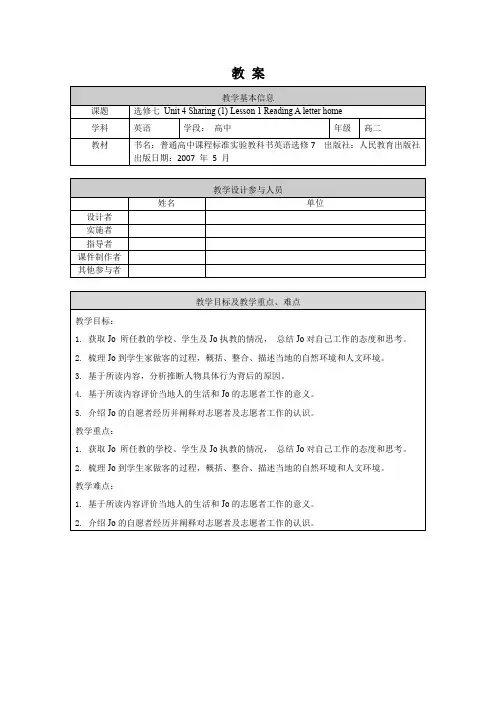
教案教学过程(表格描述)教学环节主要教学活动设置意图Step 1Pre-reading Task 1: Learn from the introduction on P28 andpictures.Q1. What information can we get from the introduction?Q2. What information can we get from the pictures?通过对课文介绍的解读,拉近学生与课文内容的距离;通过理解照片内容,激发学生对所读内容的感性认识和对异域风土人情的兴趣。
Task 2: Make a prediction:What would Jo write in her letter?通过预测,形成阅读期待。
Step2While-reading Task 1: Read for the main idea.1. Read through the letter to check predictions.What main aspects are included in the letter?Task 2: Read for detailed information.Part 1: Jo’s school life1. Get the factual information about Jo’s school life.Q1. What is the school like?Q2. What are the students like?Q3. What did Jo think of her teaching?2. What attitude does Jo hold?3. What do you think of Jo’s voluntary work?4. Appreciate language.通过整体阅读,了解文章主基本信息、结构。
学生梳理出有关学校生活的三方面信息,通过细节阅读,聚焦Jo的支教经历和情感态度。
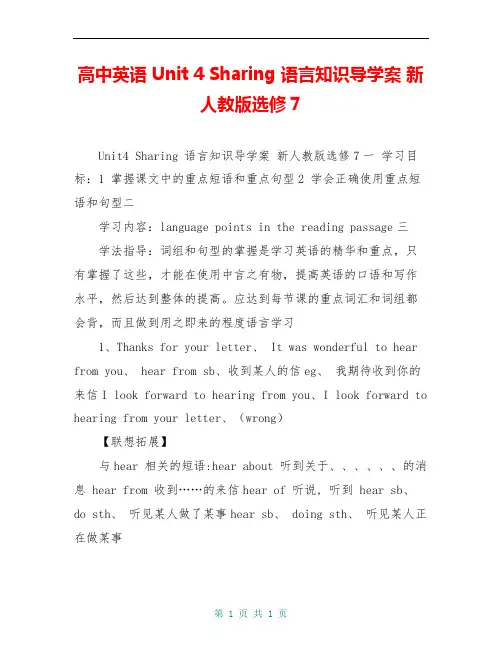
高中英语 Unit 4 Sharing 语言知识导学案新人教版选修7Unit4 Sharing 语言知识导学案新人教版选修7一学习目标:1 掌握课文中的重点短语和重点句型2 学会正确使用重点短语和句型二学习内容:language points in the reading passage三学法指导:词组和句型的掌握是学习英语的精华和重点,只有掌握了这些,才能在使用中言之有物,提高英语的口语和写作水平,然后达到整体的提高。
应达到每节课的重点词汇和词组都会背,而且做到用之即来的程度语言学习1、Thanks for your letter、 It was wonderful to hear from you、 hear from sb、收到某人的信eg、我期待收到你的来信I look forward to hearing from you、I look forward to hearing from your letter、(wrong)【联想拓展】与hear 相关的短语:hear about 听到关于、、、、、、的消息 hear from 收到……的来信hear of 听说, 听到 hear sb、do sth、听见某人做了某事hear sb、 doing sth、听见某人正在做某事2、I know you’re dying to hear all about my life here, so I’ve included some photos which will help you picture the places I talk about、be dying to do / for sth、渴望做某事;迫切想要I am dying to know what has happened、我迫切想知道发生了什么。
I am dying for a glass of water、我非常想来杯水喝(1)我极想出国_________________________________________________________ __(2)他很渴望喝点酒_______________________________________________________ 【联想拓展】“渴望”的类似说法(1) have a strong desire for sth、(2) be eager to do(3) be thirsty for sth、(4) desire to do sth、(5) long to do sth、 / for sth、单项选择:Smallpox(天花), a kind of disease, has now died______、、A、 outB、 awayC、 offD、 down3、 Sometimes I wonder how relevant chemistry is to these students, most of whom will be going back to their villages after Year8 anyway、relevant adj、有关的,相关的;切题的What you said is not relevant to the matter in hand、你所说的事与目前考虑中的问题无关。
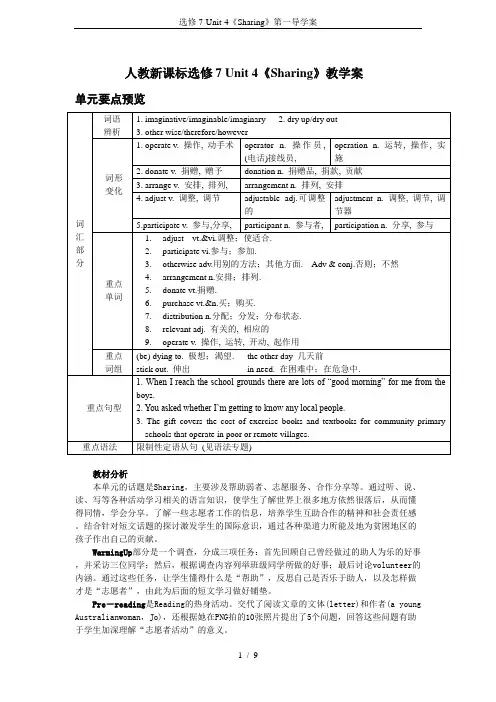
人教新课标选修7 Unit 4《Sharing》教学案单元要点预览教材分析本单元的话题是Sharing,主要涉及帮助弱者、志愿服务、合作分享等。
通过听、说、读、写等各种活动学习相关的语言知识,使学生了解世界上很多地方依然很落后,从而懂得同情,学会分享。
了解一些志愿者工作的信息,培养学生互助合作的精神和社会责任感。
结合针对短文话题的探讨激发学生的国际意识,通过各种渠道力所能及地为贫困地区的孩子作出自己的贡献。
WarmingUp部分是一个调查,分成三项任务:首先回顾自己曾经做过的助人为乐的好事,并采访三位同学;然后,根据调查内容列举班级同学所做的好事;最后讨论volunteer的内涵。
通过这些任务,让学生懂得什么是“帮助”,反思自己是否乐于助人,以及怎样做才是“志愿者”,由此为后面的短文学习做好铺垫。
Pre-reading是Reading的热身活动。
交代了阅读文章的文体(letter)和作者(a young Australian woman,Jo),还根据她在PNG拍的10张照片提出了5个问题,回答这些问题有助于学生加深理解“志愿者活动”的意义。
Reading是一篇Jo写给Rosemary的信。
其中介绍Jo在PNG(PapuaNewGuinea)的一个小山村教书。
在她写给Rosemary的信中,作者描述了该村学校的情况和去一个学生家做客的经历,使学生感受到PNG的儿童生活处境的艰难,更加珍惜自己的学习机会。
Comprehending是根据短文设计的阅读理解试题。
第一个练习要求学生读懂书信的内容,用表格的形式帮助学生整理书信中提到的关于巴布亚新几内亚村落生活及风俗习惯的信息,属于细节题。
第二个练习要求学生对文中提到的五个现象进行分析,说明原因,属于细节推理题。
第三个练习要求学生通过阅读分析生活在小山村中的积极面和消极面,这个练习进一步地开阔学生的思维,使学生对艰苦的生活有更深的理解。
第四个练习要求学生小组活动,讨论四个问题,进一步巩固学生对于课文内容的理解,并且让学生联系自己的实际情况,通过比较校舍、教学条件、生活状况等方面的问题,引发学生的深层思考,谈谈自己是否愿意参加志愿者活动。
高中英语 Unit 4 Sharing 基础词汇导学案新人教版选修7Unit4 Sharing 基础词汇导学案新人教版选修7一、学习目标:1、通过练习,读会本单元的重点词汇。
2、记住本单元重点词汇和短语的意思。
二、学法指导:单词和词组是学习英语的基础。
大家可以按照一定的规律:音标词义拼写----词性----用法,来吃透每个单词,这样才可以游刃有余的使用。
词组和一些固定搭配是目前高考考试的重点,而且很多都是无规律而言,需要同学们大量的记忆。
StepⅠ 根据所给音标大声朗读或者跟读本单元的词汇。
[eəmeɪl][ˈfɔ:tnaɪt][mʌdɪ][ˈtekstbʊk][kɒnsept][bʌkɪt][wi:klɪ][bʌbl][ˈreləvənt][rɪməʊt][rɪdʒ][ˈrektŋgl][rektŋɡjələ(r)] [ədʒʌst][pltfɔ:m][snɪf][pɑ:tɪsɪpeɪt] [ɪntɜ:prɪtə(r)] [ˈleftəʊvə(r)] [i:vl][ˈʌəwaiz][prɪvəlɪdʒ] [ˈpeɪpəˌwɜ:k] [əˈreɪndʒmənt] [ˈstrənɔ:t][ˈktəlɒg][vɒləntrɪ][ˌnɪvɜ:sərɪ] [ˌvksɪneɪʃn] [sʌplɪmənt] [plaʊ][ˈtrktə(r)][ˌi:kəˈnɒmɪk][dɪstrɪbju:t][ˌdɪstrɪbju:ʃn][faɪˈnnʃl][sɪkjʊərətɪ][ɒpəreɪt][ˈklɪnɪk] Step2 根据汉语提示写出本单元的词汇。
1、两星期 ______________2、观念,概念_____________3、有关的,切题的 ________4、遥远的,偏僻的_____________5、参与,参加_____________6、否则,不然 _________7、特权,特别优待_____________8、接到…的信_____________9、极想,渴望 ____________10、不久前的一天___________________11、偶遇_______________12、说实话,说实在的___________13、领…去某地________________14、完全变干,干透___________15、(河流、井)干涸________________16、在困难中,在危急中_____________17 肯定如此,毫无疑问 __________18、有意义,起作用______________19、渐渐开始,逐渐干 _________20伸出,显得突出_____________21、调整,适应________________Step3 大声朗读下列单词和短语relevant doorway adjust platform soft grill privilege arrangement toast comb astronaut catalogue purchase anniversary seed seedling sew ox trunk tailor income skill participate political distribution finance security operate remote otherwise donare clinicwork as take photos of be dying to do / for sth、 adapte to for sure the other day come across jump out make a difference hear fromget to know shake hands with sb、 stick out get through in the centre of upside down dry out / up in need sewing machine trunk libraryStep4 精美句子背诵。
1课题:SB7Unit 4New words1 时数(第 周第 课时)班级: 学习目标 学习重点 学习难点 目 标 与 导 入自 学 与 诊 断金昌市一中导学案编写人:To learn the pronunciation and formation of the new words The pronun ciati on and formati on of the new words The pronun ciati on of some new words 学生活动 Aim showing (目标展示) :New words : don ate, volun tary , purchase , anni versary … New phrases:in need , sewing machine , trunk library , choose from Lead-in: Some new words and phrases are necessary.1. 2. 3. 1.2. 3. 教学设计1.Students try to pronounce the new words by following the recorder two timesSs check the pronunciation in group.Some ss ask questionsabout the pronunciation of thenew words, while others try to help him or her to solve 2. the problems. Exercise .、词汇预习:1. airxn^il n M 空邮件 airportairway ________ 2, fortnight twoa fdrttiighi ,s holiday ______ fortnightly (adj / adv)Meetings take place at 皿皿堆1卅 intervals. The committee meets foi tni 法hth” _______roof 屋顶/车顶 n. roofs (pl) proofs gulfs ---------mud —— sun — weekly adj. adj. _/ yearly椭圆一airlinebeliefs 3. 4. Ask the students toread the new words to check their preview.Ask the students to write dow n some formati ons.Ask the students todraw the usages accord ing to senten ces.Ask the students todo the con solidati on and applicati on exercises.chiefsserfsmuddy water/ muddy shoes____/ mon thly 菱形 __ 4participatev ---n.n.合 作互 动学生活动 教学设计互 动 与 展 示After finishing each job, students should show them t their partners and then have a discussionto correct them. After that , the students should show their achievements o the blackboard and give some interpretations, the othermembers can add some.o After fin ishi ngeachjob,ask >n students to showthem to theirpartners And then have a discussion to correct them. Afterthat,eachpoins must be shown on the blackboard.精 讲 与 占 八、、 拨精讲词汇(必须掌握的词)1. relevant adj.相关的,切题的@ be relevant to (have sth. to do with)与 ... 相关1) These facts are releva nt to the case.2) These questi ons are not directly releva nt to his matter.@ relevance n.关联,相关性;贴切,中肯3) What he said has n creleva nee tothe matter in hand. 4) I don ' t see thevanceof your question.我不懂你这个问 题有什么意义。
高中英语第四单元 1课时 Sharing导学案新人教版选修7the key words and expressions in the whole unit: be dying to, relevant, adjust, partcipate, dry out, dry up, donate, distribute, etc、过程与方法To learn the new words 情感态度价值观 Prepare for the learning process of the whole unit、教材分析重难点Master the important language points such as: be dying to, relevant, adjust,participate, dry out, dry up, donate, distribute, etc教学设想教法explaining, and practising学法Cooperative learning、教具The multimedia computer课堂设计一、目标展示volunteer, clinic, challenging, over the last few years, in the future, in two weeks’ time, a couple of, developing country, Medecins Sans Frontieres(MSF), Malawi, Sudan, The Fred Hollows Foundation, The Cancer Council, Youth in the city, go blind, belief 二、预习检测Ask some students to read the new words in unit4三、质疑探究完成下列字词的翻译1、捐赠 _________2、自愿的 ___________3、在困难中 __________4、买,购买 ________5、周年纪念 ___________6、缝制,缝合 _________7、从……中选择_________8、公牛______________9、拖拉机______________10、种子_____________四、精讲点拨与hear 相关的短语:hear about 听到关于、、、、、、的消息hear from 收到……的来信hear of 听说, 听到hear sb、 do sth、听见某人做了某事hear sb、 doing sth、听见某人正在做某事(be) up to…多达;取决于Its up to you whether we accept the present or not、我们要不要这份礼物由你决定。
人教新课标选修7 Unit 4《Sharing》教学案单元要点预览教材分析本单元的话题是Sharing,主要涉及帮助弱者、志愿服务、合作分享等。
通过听、说、读、写等各种活动学习相关的语言知识,使学生了解世界上很多地方依然很落后,从而懂得同情,学会分享。
了解一些志愿者工作的信息,培养学生互助合作的精神和社会责任感。
结合针对短文话题的探讨激发学生的国际意识,通过各种渠道力所能及地为贫困地区的孩子作出自己的贡献。
WarmingUp部分是一个调查,分成三项任务:首先回顾自己曾经做过的助人为乐的好事,并采访三位同学;然后,根据调查内容列举班级同学所做的好事;最后讨论volunteer的内涵。
通过这些任务,让学生懂得什么是“帮助”,反思自己是否乐于助人,以及怎样做才是“志愿者”,由此为后面的短文学习做好铺垫。
Pre-reading是Reading的热身活动。
交代了阅读文章的文体(letter)和作者(a young Australian woman,Jo),还根据她在PNG拍的10张照片提出了5个问题,回答这些问题有助于学生加深理解“志愿者活动”的意义。
Reading是一篇Jo写给Rosemary的信。
其中介绍Jo在PNG(PapuaNewGuinea)的一个小山村教书。
在她写给Rosemary的信中,作者描述了该村学校的情况和去一个学生家做客的经历,使学生感受到PNG的儿童生活处境的艰难,更加珍惜自己的学习机会。
Comprehending是根据短文设计的阅读理解试题。
第一个练习要求学生读懂书信的内容,用表格的形式帮助学生整理书信中提到的关于巴布亚新几内亚村落生活及风俗习惯的信息,属于细节题。
第二个练习要求学生对文中提到的五个现象进行分析,说明原因,属于细节推理题。
第三个练习要求学生通过阅读分析生活在小山村中的积极面和消极面,这个练习进一步地开阔学生的思维,使学生对艰苦的生活有更深的理解。
第四个练习要求学生小组活动,讨论四个问题,进一步巩固学生对于课文内容的理解,并且让学生联系自己的实际情况,通过比较校舍、教学条件、生活状况等方面的问题,引发学生的深层思考,谈谈自己是否愿意参加志愿者活动。
第三、四两个练习都属于深层思考的问题。
LearningaboutLanguage分词汇和语法两部分。
其中,第一部分是有关此篇短文中的重点单词和短语。
设置了三个练习,一是根据所给解释从所学词汇中选择相应的单词;二是用恰当的词汇完成一篇短文;三是根据解释组成词组,并用词组编对话。
第二部分是有关限制性定语从句的复习。
首先从课文中找出含有限制性定语从句的句子;然后用定语从句完成句子,对定语从句加以运用;再用含有定语从句的句子回答问题;最后是两人结对活动,进一步练习使用定语从句。
Using Language是对Reading的延伸。
通过阅读,参与“Give an unusual gift”的活动。
这个部分由三个部分组成,综合训练学生听说读写四个方面的能力。
“读与说”通过图文结合的方式,介绍了一些特殊的礼品——为穷人和真正需要它们的人选购礼品。
阅读之后,完成两个练习:回答问题和把礼物名称和详细介绍配对。
“听与说”部分是采访默里大夫的经历,以听力训练为核心设置了四个活动。
1.讲述一个人的生平,用到了时间表达法;2.通过列表把握听力中的细节;3.在涉及听力内容之前让学生先就有关听力中的话题进行讨论,有助于学生快速并准确地把握听力内容;4.展开讨论,让学生思考自己将来是否愿意像默里大夫那样做个志愿服务工作者。
“写作”根据“听与说”中的话题,运用时间表达方式,根据给出的6个方面对默里大夫的情况进行写作。
Periods one & twoTeaching Aims: 教学目标1. To learn some new words and phrases.2. To master the main idea of each paragraph.3. To learn some complicated sentence patterns.Teaching contents:重点词汇Teaching Important Point: 教学重点The usage of some useful words and expressions.Teaching Difficult Point: 教学难点How to grasp and remember the detailed information of the reading material. Teaching Procedures: 教学步骤1.relevant adj. 相关的,切题的be relevant to (have sth. to do with) 与……相关1) These facts are relevant to the case.2) These questions are not directly relevant to t his matter.relevance n. 关联,相关性;贴切,中肯3) What he said has no relevance to the matter in hand.4) I don’t see the relevance of your question. 我不懂你这个问题有什么意义。
relevantly adv.irrelevant 无关紧要的,不相关的irrelevant remarks 不相关的评论be irrelevant to 与……无关联想: be related to(与...有关,和...有联系 ) be concerned with(参与,干预;关心)练习:1.His nationality ________________ (不相关) whether he is a good lawyer.(relevant)2.Do you have ________________.(相关经历)?(relevant)2. adjust v 调整;(使)适应adjust to sth. 适应……1) It took her a long time to adjust to living alone.adjust sth (to sth) 调整……(以适应……)2) Adjust your language to the age of your audience.3) Watch out for sharp bends and adjust your speed accordingly.adjust oneself to sth 使自己适应于4)He adjusted himself very quickly to the heat of the country.make adjustment to sth 调整以适应……;对……做出调整5)I’ve made a few adjustments to the design.联想:adapt v.adapt (oneself) to sth 适应adapt sth from sth 根据……改编……adopt vt. 采纳;领养练习Something is wrong with my camera. It can’t be ____ to take a better picture.A . adapted B. adjusted C. adopted D. reminded3. participate vi 参加,参与participate in sth 参加……1)I loved listening to the family softly talking to each other in their language, even though I could not participate in the conversation.2)He didn’t participate in the discussion.participation n. 参加 participation in sth3) A back injury prevented his active participation in sports.participant n. 参与者4)He has been an active participant in the discussion辨析join in sth 参加某种正在进行的活动take part in 侧重参加者持积极态度并在其中起一定的作用。
take an active part in 积极参加……participate in 参加活动join 加入某一机构,组织,团体并成为其中的一员attend 出席,到场,可接学校,会议或者讲座等作宾语练习:The teacher is easy-going, and she oft en _____ in the pupils’ games.A. participatesB. acts C .joined D. took4. otherwise ① conj: 否则,要不然;(or else)1)Shut the window, otherwise it’ll get too cold here.2) We must run, otherwise we’ll be too late.② adv: 用别的方法/ 用不同的方法3)You obviously think otherwise. 显然你的想法不同.4)He should have been working, but he was otherwise engaged.他应该在工作, 可他却干别的事。
adv. 其他方面;除此以外5) There was some music playing upstairs. Otherwise the house was silent.除此以外6) The rent is high,but otherwise the house is satisfactory.房租虽然高,但是房子其他方面还是令人满意的。
or otherwise 或其他情况,或相反4)I am not concerned with his honesty or otherwise(或不诚实).5. privilege n. 特权,特别优待 ;【sing. 】荣幸,荣耀(honor)1) Education should be a universal right and not a privilege.2) I hope to have the privilege of working with them again.have the privilege of doing sth / to do sth = have the honor of (doing) sth有幸做……; 有特权做某事3)Only members have the privilege to use it.It’s a privilege to do sth =It’s an honor to do sth 有幸做某事4)It was a great privilege to hear her sing.vt 给予特权,给予优待5) Education policies that privilege the children of poor familiesprivileged (honored) adj. 受优待的,有特权的6) She comes from a privileged background.练习1. _______ _____(荣幸之至) to make his acquaintance(认识). (it; privilege)2. The law makes him ____________________(有权利拥有)the house. (privilege) 6. arrangement n.安排;排列.1) He arranged the books on the shelf.他把书架上的书整理了一下。